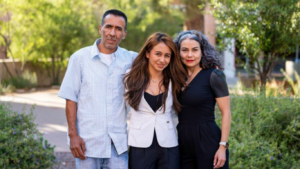Phoenix Children’s Hospital defines Adverse Childhood Experiences (ACEs) as the childhood traumas that can cause toxic stress and damage a child’s brain and overall health.
These ACEs include but are not limited to, emotional and physical abuse or neglect, witnessing a mother or mother figure treated violently, household substance abuse or mental illness, and childhood bullying.
If a child experiences a number of these “ACEs,” there is an increased chance that the child will suffer from health risks like depression, adolescent pregnancies, drug abuse, and sexually transmitted diseases. Toxic stress can also cause brain damage due to a regularly increased heart rate, blood pressure, and muscle tension. This can lead to behavioral issues like defiance, problems with memory and an inability to focus, and increased difficulty in maintaining friendships and connecting with other children.
In 2012, the National Survey of Children’s Health reported that 44.4 percent of Arizona children aged 12 to 17 have experiences at least two ACEs, greater than the national average of 30.5 percent. The Arizona ACE Consortium reported that it is estimated that over 69,000 children in Arizona have experienced five or more ACEs, enough to fill the University of Phoenix Stadium.
The good news is that hope is not lost for children suffering from childhood trauma. PBS, in conjunction with Arizona ACE Consortium and Phoenix Children’s Hospital (PCH), said that the presence of at least one stable and healthy adult in a child’s life could reverse or prevent the damaging effects of ACEs. Arizona programs are responding to these reports by implementing different factors to change the way we approach children suffering from childhood traumas.
On Oct. 22, the Arizona School Boards Association, PCH, and Arizona ACE Consortium hosted a screening of the film “Paper Tigers” at North High School. The film, directed by James Redford, follows several students from Lincoln High School, an alternative school in Walla Walla, Wash.. The high school was one of the first to implement a trauma-based approach to overcoming the ACEs of its students, a concept founded on the idea that it is more beneficial to society to heal rather than punish.
“When you grow up in a home where you are continually threatened, then your brain starts to develop to always be ready for the next threat, to always be ready for fight or flight. Rage, anger, anything can set them off. They don’t know the difference between a real tiger and a paper tiger,” said Erik Gordon, a science teacher at Lincoln High School.
“You have to unconditionally love them and you have to believe that their behavior might be out of their control. That is a bitter pill for educators to swallow,” Gordon said.
The film showed teachers, counselors, and health care providers making the intentional choice to love their students even when they are not acting lovable, and documented how the students at the alternative high school, or the school for the “delinquents,” flourished.
If a child was missing school, counselors showed up at their home to see what the cause may be. Punishments like suspension were only implemented for extreme measures, preferring instead that the students remain in the school in a positive environment. Instead, the students would be assigned “in-school-suspension” and would work on homework under supervision. A medical center was built on campus for the student’s use and they discussed everything from the negative impacts stress can put on your body, to what a healthy relationship looked like.
The school witnessed amazing results from its students, and now serves as an example for school districts around the country for the success of an environment that focuses on preventing ACEs from ruining the progression of a child’s life.
This system of trauma-based care has become one of the main focus points for Dr. Chad E. Geston, interim superintendent of the Phoenix Union High School District, in bettering the way educators in Phoenix approach students with difficult household environments.
“There is a focus on not just rigorous academic achievement but also rigorous support and love for kids,” Dr. Geston said. “Students are willing to be open when the adults authentically care about them. So for one, we have to hire the right people, and two we have to be very clear in the way that we train our teachers and our staff. At the end of the day, we have to reach the kids before we teach the kids.”
Laurie King, local educator and director of learning and communication systems at the Maricopa County Education Service Agency, has seen firsthand the difference it makes when a community responds with love and compassion to struggling students. King, an adoptive mother of eight children who came out of foster care, gave an example of the different outcome of two of her children when one was shown love and the other was shown discipline in response to negative behavior.
Her 21-year-old son Joseph struggled coming out of foster care and King said she believes he would probably have at least eight ACEs to overcome. Unfortunately, Joseph was not provided with emotional counseling and ended up being suspended around six times in high school. He was arrested at homecoming for smoking spice on campus and spent time in jail. King does not know where he is at this time.
“You don’t get taken away from your parents because things are ‘just a little rocky.’ He broke the rules and they did what they were supposed to do, and this was a school filled with loving and caring teachers and principals,” King said. “But the system really failed Joseph because he felt quickly like a criminal and started behaving like a criminal.”
In contrast, after King moved, Joseph’s younger sister, Roxanne, went to Desiderata Alternative High School in the Phoenix Union High School District. She immediately was connected to social programs designed to help students struggling with childhood trauma. She became the student body president of her high school, and when she developed behavioral issues, and started having some problems with the law, the community showed her grace and forgiveness.
“She was nurtured and brought up in a system that was focused on making sure her personal and emotional needs came before anything else,” King said.
“Twice she committed some pretty egregious acts. Desiderata went through a restorative justice program with Roxanne, where she had to work through with her community about what she did and take ownership for her actions,” King said. “There was nothing punitive about that. They didn’t remove her from the student body council, they continued to build her up, and she is now at Phoenix College, King said.”
In response to films like “Paper Tigers” and increased research about the negative impacts of ACEs, Arizona has implemented many social programs into healthcare, peer support, and the education system. Programs like STAND & SERVE, Triple P: Positive Parenting Program, and Sponsors for Scholars are a few examples of a community trying to change the conversation of how to respond to children and teenagers with major behavioral issues; to start showing love to children who are stuck in survival mode.
These advocates for social change have realized that although some of these students are reacting to “paper tigers,” the feelings of self-protection, a desire for safety, and a need for community that shows up for them are real.




